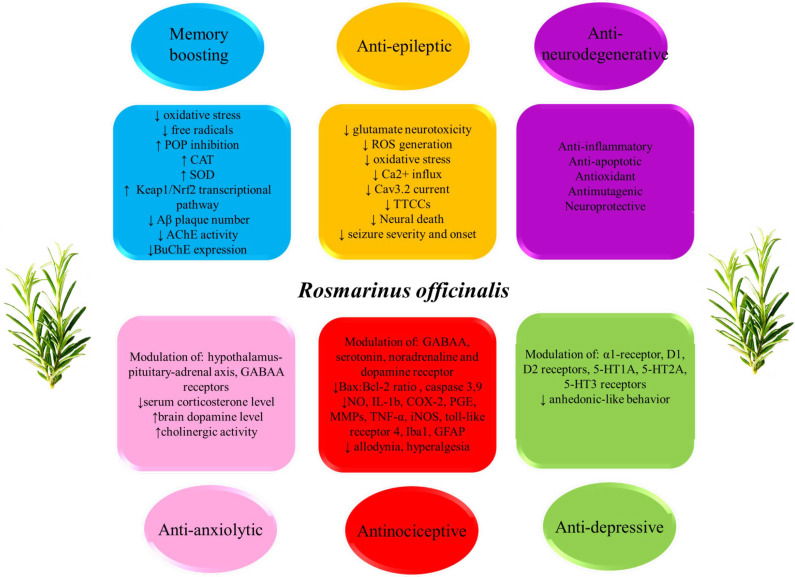Abstract
Rosemary (Rosmarinus officinalis L.) is an evergreen bushy shrub which grows along the Mediterranean Sea, and sub-Himalayan areas. In folk medicine, it has been used as an antispasmodic, mild analgesic, to cure intercostal neuralgia, headaches, migraine, insomnia emotional upset, and depression.
Different investigations have highlighted rosemary neuropharmacological properties as their main topics. Rosemary has significant antimicrobial, anti-inflammatory, anti-oxidant, anti-apoptotic, anti-tumorigenic, antinociceptive, and neuroprotective properties. Furthermore, it shows important clinical effects on mood, learning, memory, pain, anxiety, and sleep.
The aim of the current work is to review the potential neuropharmacological effects of different rosemary extracts and its active constituents on nervous system disorders, their relevant mechanisms and its preclinical application to recall the therapeutic potential of this herb and more directions of future research projects.
The data were gathered by searching the English articles in PubMed, Scopus, Google Scholar, and Web of Science. The keywords used as search terms were ‘Rosmarinus officinalis’, ‘rosemary’, ‘nervous system’, ‘depression’, ‘memory’, ‘Alzheimer’s disease’ ‘epilepsy’, ‘addiction’, ‘neuropathic pain’, and ‘disorders’. All kinds of related articles, abstracts and books were included.
No time limitation was considered. Both in vitro and in vivo studies were subjected to this investigation. This review authenticates that rosemary has appeared as a worthy source for curing inflammation, analgesic, anti-anxiety, and memory boosting.
It also arranges new perception for further investigations on isolated constituents, especially carnosic acid, rosmarinic acid, and essential oil to find exquisite therapeutics and support drug discovery with fewer side effects to help people suffering from nervous system disorders.
Conclusion
The present review demonstrates that the main ethnopharmacological uses (anti-spasm, analgesic, anti-inflammatory, anti-anxiety and memory-boosting) of rosemary have been validated by neuropharmacological investigations.
By reviewing the previous literature, it is concluded that the most important components of rosemary which are medicinally and pharmacologically active are rosmarinic acid, carnosic acid, and the essential oil.
These compounds can provide promising natural medicines in the treatment of the nervous system pathological conditions including anxiety, depression, Alzheimer’s disease, epilepsy, Parkinson’s disease, and withdrawal syndrome. It is also noteworthy to mention that studies regarding herbal medicines should be taken into more consideration because the safety and efficacy of many herbal medicines are still unclear.
Also, additional reliable trials are essential to evaluate the safety and efficacy of different constituents of rosemary in treating different nervous system disorders. Furthermore, the probable mechanisms of action and the potential antagonistic and synergistic properties of multi-component mixtures of rosemary need to be examined by the integration of physiological, pharmacological, bioavailability-centered, and pharmacokinetic methods.
Prolonged and high dose usage of traditional formulations of rosemary and its active constituents should be avoided until more profound toxicity investigations become available.
The new findings may expand the present therapeutic importance of rosemary and develop its future use in modern medicine.
https://www.ncbi.nlm.nih.gov/pmc/articles/PMC7491497/
